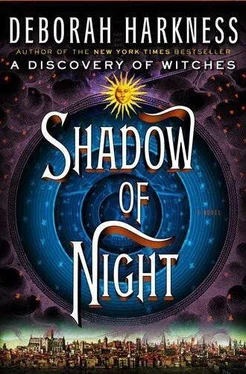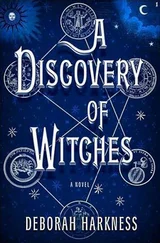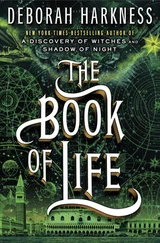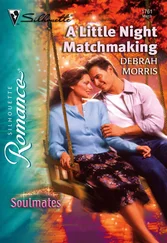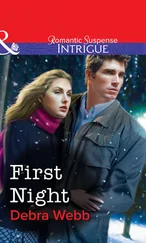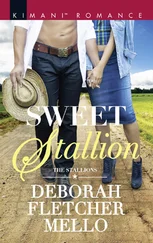That was my name now. Diana Roydon, wife of the most obscure figure associated with the mysterious School of Night. I examined the page critically. My handwriting was a disaster. It looked nothing like what I’d seen of the chemist Robert Boyle’s neat, rounded script or that of his brilliant sister, Katherine. I hoped that women’s handwriting in the 1590s was far messier than it was in the 1690s. A few more strokes of the pen and a final flourish and I would be done. Her Booke.
Male voices sounded outside. I put down my pen with a frown and went to the window.
Matthew and Walter were below. The panes of glass muffled their words, but the subject of the conversation was evidently unpleasant, judging from Matthew’s harried expression and the bristling line of Raleigh’s eyebrows. When Matthew made a dismissive gesture and turned to walk away, Walter stopped him with a firm hand.
Something had been bothering Matthew since he’d received the first batch of mail this morning. A stillness had come over him, and he’d held the pouch without opening it. Though he’d explained that the letters dealt with ordinary estate business, surely there was more there than demands for taxes and bills due.
I pressed my warm palm against the cold pane as if it were only the glass that stood between me and Matthew. The play of temperatures reminded me of the contrast between warmblooded witch and cool-blooded vampire. I returned to my seat and picked up my pen.
“You decided to make your mark on the sixteenth century after all.” Matthew was suddenly at my side. The twitch at the corner of his mouth indicated amusement but didn’t entirely disguise his tension.
“I’m still not sure that creating a lasting memento of my time here is a good idea,” I confessed. “A future scholar might realize there’s something odd about it.” Just as Kit had known there was something wrong with me .
“Don’t worry. The book won’t leave the house.” Matthew reached for his stack of mail.
“You can’t be sure of that,” I protested.
“Let history take care of itself, Diana,” he said decisively, as if the matter were now closed. But I couldn’t let go of the future—or my worries about the effects that our presence in the past might have on it.
“And I still don’t think we should let Kit keep that chess piece.” The memory of Marlowe triumphantly brandishing the tiny figure of Diana haunted me. She occupied the role of the white queen in Matthew’s costly silver chess set and had been the third object I’d used to steer us to the proper place in the past, along with Ysabeau’s earring and Matthew’s copy of Kit’s play Doctor Faustus . Two unfamiliar young daemons, Sophie Norman and her husband Nathaniel Wilson, had unexpectedly delivered it to my aunts’ house in Madison just as we were deciding to timewalk.
“Kit won it from me fair and square last night—just as he was supposed to do. At least this time I could see how he managed it. He distracted me with his rook.” Matthew dashed off a note with enviable speed before folding the pages into a neat packet. He dropped a molten blob of vermilion across the edges of the letter before pressing his signet ring into it. The golden surface of the ring bore the simple glyph for the planet Jupiter, not the more elaborate emblem that Satu had burned into my flesh. The wax crackled as it cooled. “Somehow my white queen went from Kit to a family of witches in North Carolina. We have to believe that it will do so again, with or without our help.”
“Kit didn’t know me before. And he doesn’t like me.”
“All the more reason not to worry. As long as it pains him to look upon the likeness of Diana, he won’t be able to part with it. Christopher Marlowe is a masochist of the first order.” Matthew took up another letter and sliced it open with his knife.
I surveyed the other items on my table and picked up a pile of coins. A working knowledge of Elizabethan currency had not been covered in my graduate education. Nor had household management, the proper order of donning undergarments, forms of address for servants, or how to make a medicine for Tom’s headache. Discussions with Françoise about my wardrobe revealed my ignorance of common names for ordinary colors. “Gooseturd green” was familiar to me, but the peculiar shade of grizzled brown known as “rat hair” was not. My experiences thus far had me planning to throttle the first Tudor historian I met upon my return for gross dereliction of duty.
But there was something compelling about figuring out the details of everyday life, and I quickly forgot my annoyance. I picked through the coins in my palm, looking for a silver penny. It was the cornerstone on which my precarious knowledge was built. The coin was no bigger than my thumbnail, as thin as a wafer, and bore the same profile of Queen Elizabeth as did most of the others. I organized the rest according to relative worth and began an orderly account of them on the next clean page in my book.
“Thank you, Pierre,” Matthew murmured, barely glancing up as his servant whisked away the sealed letters and deposited still more correspondence on the surface.
We wrote in companionable silence. Soon finished with my list of coins, I tried to remember what Charles, the household’s laconic cook, had taught me about making a caudle—or was it a posset?
A Caudle for pains in the head... Satisfied with the relatively straight line of text, three tiny blots, and the wobbly C , I continued.
Set your water to boil. Beat two egge yolkes. Add white wine and beat some more. When the water boils, set it to cool, then add the wine and egge. Stirre it as it boils again, adding saffron and honey .
The resulting mixture had been revolting—violently yellow with the consistency of runny cottage cheese—but Tom had slurped it down without complaint. Later, when I’d asked Charles for the proper proportion of honey to wine, he’d thrown up his hands in disgust at my ignorance and stalked away without a word.
Living in the past had always been my secret desire, but it was far more difficult than I’d ever imagined. I sighed.
“You’ll need more than that book to feel at home here.” Matthew’s eyes didn’t leave his correspondence. “You should have a room of your own, too. Why don’t you take this one? It’s bright enough to serve as a library. Or you could turn it into an alchemical laboratory—although you might want somewhere more private if you’re planning to turn lead into gold. There’s a room by the kitchen that might do.”
“The kitchen may not be ideal. Charles doesn’t approve of me,” I replied.
“He doesn’t approve of anyone. Neither does Françoise—except for Charles, of course, whom she venerates as a misunderstood saint despite his fondness for drink.”
Sturdy feet tromped down the hall. The disapproving Françoise appeared at the threshold. “There are men here for Mistress Roydon,” she announced, stepping aside to reveal a gray-haired septuagenarian with callused hands and a much younger man who shifted from one foot to the other. Neither of these men was a creature.
“Somers.” Matthew frowned. “And is that young Joseph Bidwell?”
“Aye, Master Roydon.” The younger man pulled his cap from his head.
“Mistress Roydon will allow you to take her measurements now,” Françoise said.
“Measurements?” The look Matthew directed to me and Françoise demanded an answer—quickly.
“Shoes. Gloves. For madame ’s wardrobe,” Françoise said. Unlike petticoats, shoes were not one-size-fits-most.
“I asked Françoise to send for them,” I explained, hoping to gain Matthew’s cooperation. Somers’s eyes widened at my strange accent before his face returned to an expression of neutral deference.
Читать дальше
